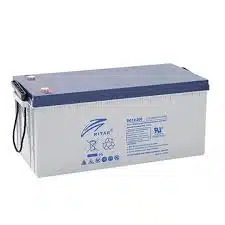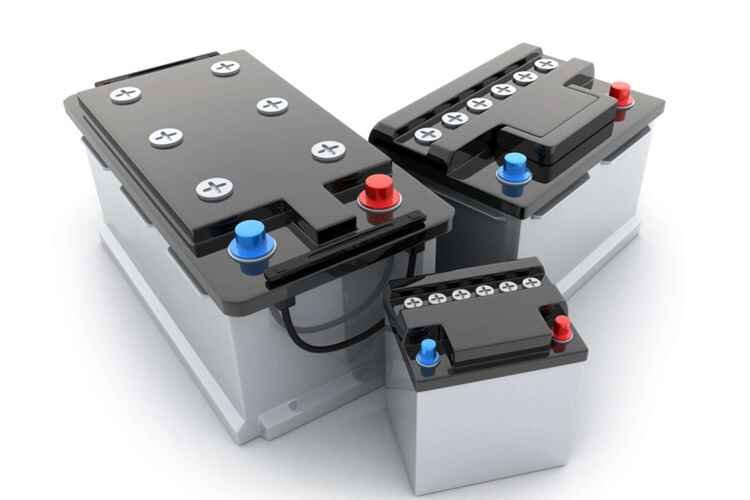Blogs
Long-Lasting Lithium Batteries for Solar Systems: Ultimate Efficiency

Long-lasting lithium batteries are essential for effective solar systems. They offer reliability and durability.
Lithium batteries have transformed solar power storage. Their ability to store energy efficiently makes them ideal for solar systems. Unlike traditional batteries, lithium batteries have a longer lifespan and require less maintenance. They ensure that solar systems can run smoothly, even during cloudy days or at night.
These batteries also charge faster and lose less energy over time. By investing in long-lasting lithium batteries, you can maximize the benefits of your solar system. This blog will explore why lithium batteries are a smart choice for solar energy storage, highlighting their advantages and how they enhance the performance of solar systems.
Introduction To Lithium Batteries
Lithium batteries have become essential in today’s energy systems. These batteries offer a reliable and long-lasting solution for energy storage. They are especially valuable for solar systems. Their efficiency and durability make them a preferred choice.
Importance In Solar Systems
Solar systems need reliable storage solutions. Lithium batteries provide that reliability. They store solar energy efficiently. This stored energy powers homes and businesses when the sun is not shining.
Traditional batteries often fail to meet the demands. Lithium batteries excel in this area. They have longer lifespans and higher efficiency.
- Durable and long-lasting
- High energy efficiency
- Reduced maintenance needs
Basic Components
Understanding the components helps in grasping their efficiency. Lithium batteries consist of several key parts.
- Anode: This is the negative electrode. It releases lithium ions during discharge.
- Cathode: The positive electrode. It receives lithium ions during discharge.
- Electrolyte: This medium allows the flow of ions. It connects the anode and cathode.
- Separator: It prevents the electrodes from touching. It also allows ion flow.
The interaction of these parts results in efficient energy storage and release. The composition and design of these components contribute to the battery’s longevity and performance.
Here’s a quick table to summarize the components:
| Component | Function |
|---|---|
| Anode | Releases lithium ions |
| Cathode | Receives lithium ions |
| Electrolyte | Allows ion flow |
| Separator | Prevents electrode contact |
Understanding these components highlights why lithium batteries are ideal for solar systems. They provide efficient, reliable, and long-term energy storage solutions.
Advantages Of Lithium Batteries
Lithium batteries have become the preferred choice for solar systems. Their benefits far outweigh those of traditional batteries. Let’s explore the key advantages of using lithium batteries in solar systems.
Longevity
Lithium batteries are known for their impressive lifespan. They typically last between 10 to 15 years. This long life means fewer replacements and less maintenance over time.
Traditional batteries, like lead-acid, usually need replacement every 3 to 5 years. This makes lithium batteries a more cost-effective choice in the long run. Their longevity also means they are more environmentally friendly. Fewer batteries disposed of means less waste in landfills.
Energy Density
One of the standout features of lithium batteries is their high energy density. They can store more energy in a smaller space. This makes them ideal for solar systems with limited space.
Here is a comparison table for clarity:
| Battery Type | Energy Density (Wh/kg) |
|---|---|
| Lithium | 150-200 |
| Lead-Acid | 30-50 |
As shown, lithium batteries have a much higher energy density. This means they can power more devices for a longer time. For solar systems, this translates to better efficiency and performance.
Efficiency In Solar Systems
Long-lasting lithium batteries are crucial for solar systems. They play a key role in storing energy efficiently. This efficiency is vital for maximizing the energy output and ensuring the reliability of the solar system.
Energy Conversion
Energy conversion is a critical process in solar systems. Solar panels convert sunlight into electricity. The efficiency of this process can be affected by various factors. Here’s a simple breakdown:
- Panel Quality: High-quality panels convert more sunlight into electricity.
- Sunlight Exposure: More sunlight leads to higher energy conversion.
- Temperature: Higher temperatures can reduce conversion efficiency.
Lithium batteries help in storing this converted energy effectively. They ensure that the energy is available when needed, even during non-sunny periods.
Storage Capabilities
The storage capabilities of lithium batteries are exceptional. They can store large amounts of energy for longer periods. Here are some key points:
- High Energy Density: Lithium batteries have a high energy density, meaning they can store more energy in a smaller space.
- Long Lifespan: These batteries have a longer lifespan compared to other types, making them cost-effective in the long run.
- Low Maintenance: They require less maintenance, reducing the overall upkeep cost of the solar system.
These characteristics make lithium batteries ideal for solar systems. They ensure that the stored energy is used efficiently, providing a steady power supply.
Here’s a comparison table highlighting the advantages of lithium batteries:
| Feature | Lithium Batteries | Other Batteries |
|---|---|---|
| Energy Density | High | Low to Medium |
| Lifespan | Long | Short to Medium |
| Maintenance | Low | High |
By choosing lithium batteries, you ensure the efficiency and reliability of your solar system. They provide a sustainable and cost-effective energy solution.
Types Of Lithium Batteries
Solar systems rely on efficient energy storage. Choosing the right lithium battery is crucial. Different types of lithium batteries offer unique benefits for solar systems. Understanding these types helps you make an informed decision.
Lithium Iron Phosphate
Lithium Iron Phosphate (LiFePO4) batteries are popular for solar systems. They offer many advantages:
- Long lifespan
- Stable chemistry
- High safety
- Low maintenance
LiFePO4 batteries can last up to 10 years. Their stable chemistry reduces the risk of overheating. This makes them a safe choice for home solar systems. These batteries also require less maintenance compared to other types.
Lithium Nickel Manganese Cobalt Oxide
Lithium Nickel Manganese Cobalt Oxide (NMC) batteries are another option. They are known for:
- High energy density
- Lightweight design
- Versatility
NMC batteries offer a high energy density. This means they store more energy in a smaller space. Their lightweight design makes them easy to install. NMC batteries are versatile and used in various applications, including electric vehicles and home solar systems.
| Battery Type | Benefits |
|---|---|
| LiFePO4 | Long lifespan, stable chemistry, high safety, low maintenance |
| NMC | High energy density, lightweight, versatile |
Installation And Maintenance
Long-lasting lithium batteries have become essential for solar systems. Proper installation and routine maintenance are key to ensuring their efficiency. This section will guide you through the setup process and routine checks required for your lithium batteries.
Setup Process
Begin with selecting a suitable location for the batteries. The area should be dry, cool, and well-ventilated. Ensure it is away from direct sunlight and moisture.
Next, connect the batteries to the solar inverter. Use the correct wiring and follow the manufacturer’s guidelines. Securely fasten all connections to prevent loose contacts.
After connecting, configure the battery management system (BMS). The BMS monitors the battery’s performance and health. It is crucial for preventing overcharging and deep discharges.
Finally, check the system settings on the inverter. Ensure they align with the battery specifications. This prevents any mismatch and ensures optimal performance.
Routine Checks
Regular maintenance extends the lifespan of your lithium batteries. Conduct these checks periodically:
- Visual Inspection: Look for any signs of damage or wear. Ensure the terminals are clean and free from corrosion.
- Performance Monitoring: Use the BMS to monitor battery performance. Check for any anomalies in the charge and discharge cycles.
- Voltage and Temperature: Measure the voltage and temperature regularly. Ensure they remain within the recommended range.
- Firmware Updates: Update the BMS firmware as necessary. This ensures the system is running with the latest features and improvements.
Keeping a log of these checks helps in tracking the battery health over time. This proactive approach prevents unexpected failures and maintains system efficiency.
Cost Analysis
Investing in long-lasting lithium batteries for solar systems can be a significant decision. Understanding the cost analysis is crucial. This section will break down the initial investment and long-term savings. Let’s dive in.
Initial Investment
The initial investment in lithium batteries for solar systems can be high. These batteries offer advanced technology, which impacts their price. Here’s a comparison:
| Battery Type | Cost per kWh | Lifespan |
|---|---|---|
| Lithium Batteries | $600 – $1,000 | 10-15 years |
| Lead-Acid Batteries | $150 – $300 | 3-5 years |
Though lithium batteries have a higher upfront cost, they offer a longer lifespan. This makes them a wise investment in the long run.
Long-term Savings
Long-term savings with lithium batteries are significant. They have a longer lifespan and require less maintenance. Let’s look at some key points:
- Reduced Replacement Costs: Fewer replacements mean lower costs over time.
- Higher Efficiency: Lithium batteries have better efficiency, saving energy costs.
- Low Maintenance: Minimal maintenance reduces ongoing expenses.
Here’s a breakdown of potential savings over ten years:
| Battery Type | Maintenance Costs | Replacement Costs | Total Savings |
|---|---|---|---|
| Lithium Batteries | $200 | $0 | $2,800 |
| Lead-Acid Batteries | $500 | $1,500 | $2,000 |
By investing in lithium batteries, you can save more in the long run. This makes them a smart choice for your solar system.
Environmental Impact
Long-lasting lithium batteries for solar systems have gained popularity. They offer excellent energy storage. But, their environmental impact is crucial to consider. These batteries can help reduce carbon footprints. Yet, they also pose challenges in waste management and resource use.
Recycling Options
Proper recycling of lithium batteries is vital. It prevents harmful chemicals from polluting the environment. Several methods exist to recycle these batteries:
- Mechanical processes: Shredding and sorting materials.
- Hydrometallurgical processes: Using acids to extract metals.
- Pyrometallurgical processes: High-temperature techniques to reclaim valuable elements.
Recycling helps recover materials like lithium, cobalt, and nickel. These materials can be reused in new batteries. This reduces the need for new mining activities, conserving natural resources.
Sustainability Benefits
Lithium batteries offer several sustainability benefits for solar systems. They have a long lifespan, reducing the frequency of replacements. Fewer replacements mean less waste and lower resource consumption.
These batteries also have high energy efficiency. They store and release energy with minimal losses. This efficiency reduces the overall energy required, supporting a sustainable energy system.
Using lithium batteries in solar systems promotes the use of renewable energy. This shift reduces dependence on fossil fuels. It contributes to lower greenhouse gas emissions and a cleaner environment.
Overall, long-lasting lithium batteries can be a key component in building a sustainable future.
Future Of Lithium Batteries
The future of lithium batteries looks promising for solar systems. These batteries offer long-lasting energy storage. They are ideal for renewable energy solutions. Let’s explore the future advancements and market trends.
Technological Advancements
Technological advancements are driving the future of lithium batteries. Here are some key developments:
- Improved Energy Density: New materials are boosting energy storage.
- Longer Lifespan: Enhancements in battery chemistry increase lifespan.
- Faster Charging: Advanced designs allow quicker charging times.
- Greater Efficiency: Better efficiency reduces energy loss during charging and discharging.
These advancements make lithium batteries more efficient and reliable. They support the growing demand for renewable energy storage.
Market Trends
Market trends are also shaping the future of lithium batteries. Here are some notable trends:
|
Trend |
Description |
|
Rising Demand |
More people are adopting solar systems. |
|
Cost Reduction |
Battery costs are decreasing due to mass production. |
|
Innovation |
Companies are investing in research and development. |
These trends indicate a bright future for lithium batteries in solar systems. The market is evolving rapidly. It is paving the way for more sustainable energy solutions.
Frequently Asked Questions
What Are Lithium Batteries For Solar Systems?
Lithium batteries store energy from solar panels for later use. They are efficient, durable, and have a long lifespan, making them ideal for solar systems.
How Long Do Lithium Solar Batteries Last?
Lithium solar batteries typically last between 10 to 15 years. Their lifespan depends on usage, maintenance, and environmental conditions.
Are Lithium Batteries Better For Solar Systems?
Yes, lithium batteries are better for solar systems. They offer higher efficiency, longer lifespan, and require less maintenance compared to other battery types.
How Do Lithium Solar Batteries Work?
Lithium solar batteries store energy generated by solar panels. They release stored energy when solar panels can’t produce electricity, like during nighttime.
Conclusion
Long-lasting lithium batteries enhance solar system efficiency. They provide reliable and sustainable energy. With low maintenance and high performance, they offer great value. Investing in these batteries means fewer replacements and reduced costs. Their durability ensures a stable power supply for years.
Solar systems paired with lithium batteries are a smart choice. They help in reducing carbon footprints. Consider long-lasting lithium batteries for your solar needs. Your energy solutions become more efficient and environmentally friendly. Make a wise choice for a brighter, greener future.



























